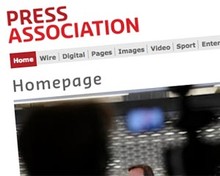
Giving evidence to a House of Commons select committee inquiry into the future of local and regional media, Tony Watson said the project would aim to increase coverage of local public institutions.
As part of the initiative, the agency would recruit journalists and deploy them within a defined area and for a specified time period to cover local authorities and public bodies, explained Watson.
The aims of the pilot would be to ascertain demand from local media for this type of news and to improve the level of coverage of these institutions, he said.
"In certain areas the reduction in the number of journalists that are out there gathering is bound to have an impact on the number of stories a newspaper can cover," said Watson.
"The coverage of public institutions in certain areas has diminished over time and that certainly has an impact of democratic engagement and holding public institutions to account.
"I would class public service reporting as coverage of those public institutions that have power and influence over people's lives and the coverage of those activities are essential to the functioning of a healthy democracy."
Policy makers and government should consider what support they can offer public service reporting as well as developing funding packages for public service broadcasting, as suggested in the Digital Britain report, he added.
Watson said he hoped the pilot would help the local news industry and the agency find solutions and better understand the extent of 'patchy coverage' for local public bodies.
Trinity Mirror will partner the PA during the pilot, which is planned for the autumn. It will be up to the newspaper group to package the material 'in more interesting ways than other media competitors' to demonstrate how such news coverage can add to plurality, he said.
The agency is seeking independent funding for the project, added Watson.
Local council newspapers
Local authorities have the right and 'indeed an obligation' to talk with their council tax payers, but 'there's a world of difference between that and wanting to set yourself up as a bona fide newspaper competing with local titles', said Watson.
While depleted resources has no doubt impacted on the regional press' breadth of coverage, the rise of council newspapers should not go unchallenged and the decision to ask the Audit Commission to review them is 'right and proper', he added.
Following Watson in giving evidence to the committee, Newspaper Society director David Newell agreed: "We're not saying local authorities can't have website or publications, but that there should be a fairly clear, common set of rules that they should abide by."
Geraldine Allinson, chairman of Kent Messenger Group, said competition for readers from local council publications was being heightened by competition for advertising revenue.
Local authority publications should have their circulation and readership figures audited in the same way as local press, she added.
The credibility of such titles should be questioned, added Belfast Telegraph editor-in-chief Ed Currran, who was also giving evidence to the hearing.
Councils should welcome the independent scrutiny that the local press offers and realise that the majority of coverage is not negative, he said.
Free daily newsletter
If you like our news and feature articles, you can sign up to receive our free daily (Mon-Fri) email newsletter (mobile friendly).
Related articles
- Protecting independent journalism, with Lexie Kirkconnell-Kawana of IMPRESS
- Five key takeaways from the UK select committee on the future of news
- The first UK local news publisher gains charitable status
- New app uses geolocation to help local publishers boost ad revenue
- How MyLocal Lincolnshire and Ping! are innovating local media









